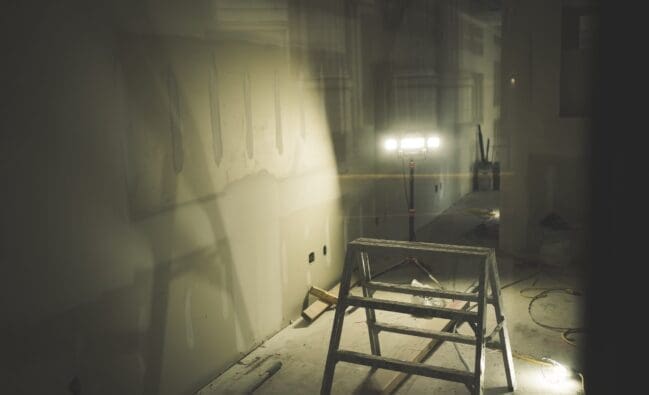When selecting materials for interior walls in construction projects, understanding the differences between drywall plasterboard and traditional plaster is crucial. Moreover, each material offers unique benefits and challenges that can significantly impact the outcome of a building or renovation project. As a leader in the UK building materials market, Drywall Pro-Cut is here to guide you through the key distinctions and help you make the best choice for your needs.
What is Drywall?
Drywall, also known as gypsum board, plasterboard, or sheetrock, is a staple in modern construction. It is made from gypsum plaster sandwiched between two thick sheets of paper, making it lightweight, easy to install, and highly energy-efficient. Drywall plasterboard is particularly favoured for its quick installation process and its ability to create smooth, even walls and ceilings with minimal effort. It’s a go-to material for contractors looking to streamline their projects without sacrificing quality.
Key Features of Drywall:
Quick Installation: Drywall panels can be easily cut to size and secured to wall frames using screws, significantly speeding up construction timelines.
Energy Efficiency: The insulating properties of drywall help maintain indoor temperatures, reducing energy costs for heating and cooling.
Versatility: Drywall can be used in various applications, from standard wall coverings to specialised fire-resistant and moisture-resistant installations.
What is Plaster?
Plaster is a traditional building material with a history that dates back centuries. Typically composed of gypsum, lime, or cement mixed with water and sand, plaster is applied wet and hardens to form a dense, solid surface. This material is renowned for its superior soundproofing qualities and its ability to create a hard, durable finish that stands the test of time.
Key Features of Plaster:
Superior Soundproofing: Plaster’s density makes it an excellent choice for spaces where noise reduction is essential.
Aesthetic Appeal: Plaster provides a smooth, high-quality finish that can be customised with various textures and designs, making it ideal for high-end or historical projects.
Durability: Once set, plaster is highly durable and resistant to daily wear and tear, making it a long-lasting option for interior walls.
Installation Comparisons: Drywall vs. Plaster
Drywall Installation:
One of the most significant advantages of drywall is its ease of installation. Unlike plaster, which requires skilled labour to apply multiple coats, drywall panels can be quickly cut to fit and attached to wall frames. This not only reduces the amount of labour required but also speeds up the overall construction process. For large-scale projects or tight deadlines, drywall is the more cost-effective option.
Why Choose Drywall Plasterboard?
Less Labour-Intensive: Drywall can be installed by a smaller crew with less specialised training.
Cost-Effective: The efficiency of drywall installation translates to lower labour costs and faster project completion times, making it a budget-friendly choice for large projects.
Plaster Application:
Applying plaster, on the other hand, is a more labour-intensive process. It involves mixing the material on-site and applying it in multiple coats, each requiring time to dry. While this method takes longer, it results in a hard, smooth finish that is unmatched by drywall. Plaster is often the material of choice for projects that prioritise aesthetics and long-term durability.
Why Choose Plaster?
High-Quality Finish: Plaster offers a level of finish that is ideal for high-end or historical renovations where appearance is paramount.
Soundproofing: The dense nature of plaster provides superior soundproofing, making it an excellent choice for projects requiring noise reduction.
Functional Benefits of Drywall and Plaster
Soundproofing
Plaster: Due to its density and rigidity, plaster is inherently better at soundproofing. It’s ideal for environments where noise control is a priority, such as recording studios, conference rooms, or multi-family housing.
Drywall: While drywall isn’t naturally as soundproof as plaster, it can be enhanced with additional materials like acoustic panels or insulation to improve its sound-dampening capabilities.
Energy Efficiency
Drywall excels in energy efficiency, particularly when used in conjunction with modern insulation materials. Its insulating properties help maintain indoor temperatures, contributing to lower energy consumption and costs. Additionally, this makes drywall a smart choice for environmentally conscious projects aiming to achieve sustainability certifications like LEED.
Why Choose Drywall Pro-Cut for Your Project?
At Drywall Pro-Cut, we specialise in providing high-quality drywall solutions that are pre-manufactured and cut to precise specifications offsite. Similarly, this innovative approach ensures consistency and quality across all components while reducing on-site waste and simplifying the installation process. Our expert team is dedicated to supporting contractors and builders in achieving efficient, reliable results, no matter the size or complexity of the project.
Why Drywall Pro-Cut Stands Out
Expertise and Innovation: With years of experience in the industry, we lead the way in offsite drywall production, constantly innovating to meet the evolving needs of the construction sector.
Quality Assurance: Every product is manufactured to the highest standards, ensuring you receive only the best for your project.
Sustainability: Our processes minimise waste and promote sustainable building practices, making us the preferred choice for eco-friendly construction projects.
Conclusion: Making the Right Choice for Your Project
Choosing between drywall and plaster depends on several factors, including project budget, desired aesthetic, and functional requirements. Furthermore, by understanding the unique properties of each material, you can make an informed decision that enhances the success of your construction project. At Drywall Pro-Cut, we are here to guide you every step of the way, offering expert advice and top-quality products tailored to your specific needs.
Are you ready to choose between drywall plasterboard and traditional plaster for your next project?
Contact Drywall Pro-Cut today for expert advice and quality products that meet your construction needs.


